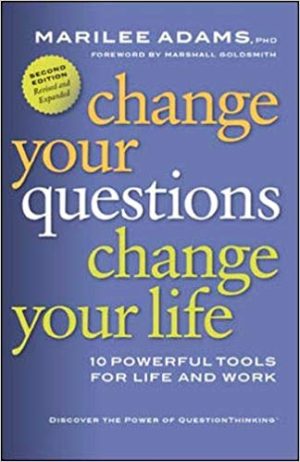There is a constant stream of questions running through the back of our mind. Something we see, something we hear, a memory that pops up – all of these things are likely to prompt some questions. Most of the time we pay no attention to these questions; they are just a part of the background processing that takes place in our brain. Sometimes, however, these questions are loud enough that we hear them as questions that we are asking ourselves. Sometimes we feel compelled to ask them of someone in a conversation. These questions can have a powerful influence on the way that we think and the way that we interact with others.

The big idea in the book, “Change Your Questions, Change Your Life” by Marilee Adams, is that these questions, the ones that are loud enough for us to pay attention to, are often what the author calls Judger questions. The problem with Judger questions is that they are either self-defeating (when we are asking them of ourselves) or they damage relationships (when we ask them about others). Instead of Judger questions, the author urges us to develop the practice of asking Learner questions.
It is human nature to be in Judger mode. Judger mode is protective, looking for risk or danger. When we ask Judger questions of ourselves, they sound much like the inner critic: “What’s wrong with me?” or “Why bother?” When we ask them about other people, either silently to ourselves or aloud, they are searching for ill motives or weaknesses in the other person: “What’s wrong with him/her?” or “What are they trying to do here?” Sometimes Judger questions are aimed at winning or gaining something: “How do I prove I’m right?” or “What should I do to get out of this situation?”
The author maintains that, while we all operate in the Judger mindset occasionally, the better choice is to develop a more robust Learner mindset and to operate from that mode. When we hear ourselves asking Judger questions, switch to Learner mindset by asking, “Am I in Judger?, Will it get me what I really want?, Where would I rather be?”
The Learner mindset asks question from an accepting, open, responsive stance. When we are asking questions of ourselves, these might be questions such as “What do I value about myself?”, “What’s possible?”, or “What are the best steps forward?” When we are observing another person, Learner might ask “What is he/she thinking, feeling, and wanting?” or “What do they need in this situation?”
The book is written in the form of a fable, in which the main character has risen through the organization by operating as the “answer man.” Now in a leadership position, his team is failing because he always falls back on giving answers, making the team disrespect him and fail to coalesce and collaborate. Through a leadership coach he learns the value of asking powerful questions, changing the way that he leads and then building a successful team.
Leadership tools are often relationship tools, and that is the case here. The book demonstrates how much more effective questions are at building relationships, rather than always providing answers or dealing with each other from a Judger mindset.
Since an organization’s culture generally reflects the character of the leader, there is a chapter on building Learner teams and keeping them from becoming Judger teams. There is also a chapter on Q-Storming, a process similar to brainstorming but relying on questions only. The book also includes a workbook section that might serve as a substitute for coaching in developing the Learner mindset.
“Poor leaders rarely ask questions of themselves or others. Good leaders, on the other hand, ask many questions. Great leaders ask the great questions.” – Michael Marquardt
On her website, Marilee Adams cites a study in which leaders judged to be the poorest in leadership ability made statements 90% of the time and asked questions only 10% of the time. Those rated as the best leaders used questions 70% of the time. In general, this book teaches valuable tools for becoming an effective leader who operates from a Learner mindset and asks powerful questions.

Add your comment